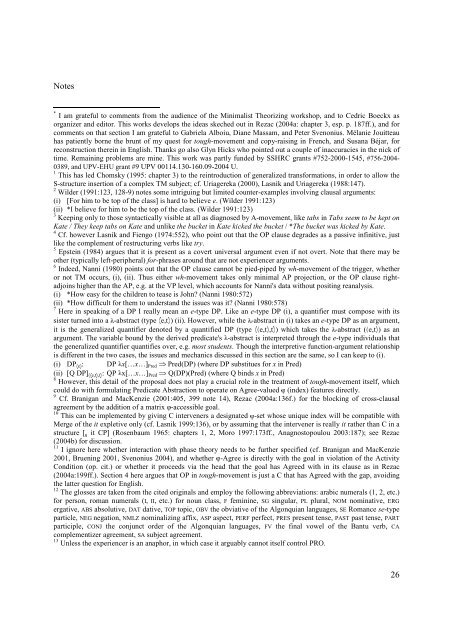1 On tough-movement* Milan Rezac, University ... - Multimania.co.uk
1 On tough-movement* Milan Rezac, University ... - Multimania.co.uk
1 On tough-movement* Milan Rezac, University ... - Multimania.co.uk
You also want an ePaper? Increase the reach of your titles
YUMPU automatically turns print PDFs into web optimized ePapers that Google loves.
Notes<br />
* I am grateful to <strong>co</strong>mments from the audience of the Minimalist Theorizing workshop, and to Cedric Boeckx as<br />
organizer and editor. This works develops the ideas skeched out in <strong>Rezac</strong> (2004a: chapter 3, esp. p. 187ff.), and for<br />
<strong>co</strong>mments on that section I am grateful to Gabriela Alboiu, Diane Massam, and Peter Svenonius. Mélanie Jouitteau<br />
has patiently borne the brunt of my quest for <strong>tough</strong>-movement and <strong>co</strong>py-raising in French, and Susana Béjar, for<br />
re<strong>co</strong>nstruction therein in English. Thanks go also Glyn Hicks who pointed out a <strong>co</strong>uple of inaccuracies in the nick of<br />
time. Remaining problems are mine. This work was partly funded by SSHRC grants #752-2000-1545, #756-2004-<br />
0389, and UPV-EHU grant #9 UPV 00114.130-160.09-2004 U.<br />
1 This has led Chomsky (1995: chapter 3) to the reintroduction of generalized transformations, in order to allow the<br />
S-structure insertion of a <strong>co</strong>mplex TM subject; cf. Uriagereka (2000), Lasnik and Uriagereka (1988:147).<br />
2 Wilder (1991:123, 128-9) notes some intriguing but limited <strong>co</strong>unter-examples involving clausal arguments:<br />
(i) [For him to be top of the class] is hard to believe e. (Wilder 1991:123)<br />
(ii) *I believe for him to be the top of the class. (Wilder 1991:123)<br />
3 Keeping only to those syntactically visible at all as diagnosed by A-movement, like tabs in Tabs seem to be kept on<br />
Kate / They keep tabs on Kate and unlike the bucket in Kate kicked the bucket / *The bucket was kicked by Kate.<br />
4 Cf. however Lasnik and Fiengo (1974:552), who point out that the OP clause degrades as a passive infinitive, just<br />
like the <strong>co</strong>mplement of restructuring verbs like try.<br />
5 Epstein (1984) argues that it is present as a <strong>co</strong>vert universal argument even if not overt. Note that there may be<br />
other (typically left-peripheral) for-phrases around that are not experiencer arguments.<br />
6 Indeed, Nanni (1980) points out that the OP clause cannot be pied-piped by wh-movement of the trigger, whether<br />
or not TM occurs, (i), (ii). Thus either wh-movement takes only minimal AP projection, or the OP clause rightadjoins<br />
higher than the AP, e.g. at the VP level, which ac<strong>co</strong>unts for Nanni's data without positing reanalysis.<br />
(i) *How easy for the children to tease is John? (Nanni 1980:572)<br />
(ii) *How difficult for them to understand the issues was it? (Nanni 1980:578)<br />
7 Here in speaking of a DP I really mean an e-type DP. Like an e-type DP (i), a quantifier must <strong>co</strong>mpose with its<br />
sister turned into a λ-abstract (type 〈e,t〉) (ii). However, while the λ-abstract in (i) takes an e-type DP as an argument,<br />
it is the generalized quantifier denoted by a quantified DP (type 〈〈e,t〉,t〉) which takes the λ-abstract (〈e,t〉) as an<br />
argument. The variable bound by the derived predicate's λ-abstract is interpreted through the e-type individuals that<br />
the generalized quantifier quantifies over, e.g. most students. Though the interpretive function-argument relationship<br />
is different in the two cases, the issues and mechanics discussed in this section are the same, so I can keep to (i).<br />
(i) DP 〈e〉: DP λx[…x…] Pred Pred(DP) (where DP substitues for x in Pred)<br />
(ii) [Q DP] 〈〈e,t〉,t〉: QP λx[…x…] Pred Q(DP)(Pred) (where Q binds x in Pred)<br />
8 ⇒<br />
However, this detail of the proposal does not play a crucial role in the treatment of <strong>tough</strong>-movement itself, which<br />
<strong>co</strong>uld do with formulating Predicate Abstraction to operate on φ Agree-valued (index) features directly.<br />
9 Cf. Branigan and MacKenzie (2001:405, 399 note 14), <strong>Rezac</strong> (2004a:136f.) for the blocking of cross-clausal<br />
agreement by the addition of a matrix φ-accessible goal.<br />
10 This can be implemented by giving C interveners a designated φ-set whose unique index will be <strong>co</strong>mpatible with<br />
Merge of the it expletive only (cf. Lasnik 1999:136), or by assuming that the intervener is really it rather than C in a<br />
structure [ α it CP] (Rosenbaum 1965: chapters 1, 2, Moro 1997:173ff., Anagnostopoulou 2003:187); see <strong>Rezac</strong><br />
(2004b) for discussion.<br />
11 I ignore here whether interaction with phase theory needs to be further specified (cf. Branigan and MacKenzie<br />
2001, Bruening 2001, Svenonius 2004), and whether φ-Agree is directly with the goal in violation of the Activity<br />
Condition (op. cit.) or whether it proceeds via the head that the goal has Agreed with in its clause as in <strong>Rezac</strong><br />
(2004a:199ff.). Section 4 here argues that OP in <strong>tough</strong>-movement is just a C that has Agreed with the gap, avoiding<br />
the latter question for English.<br />
12 The glosses are taken from the cited originals and employ the following abbreviations: arabic numerals (1, 2, etc.)<br />
for person, roman numerals (I, II, etc.) for noun class, F feminine, SG singular, PL plural, NOM nominative, ERG<br />
ergative, ABS absolutive, DAT dative, TOP topic, OBV the obviative of the Algonquian languages, SE Romance se-type<br />
particle, NEG negation, NMLZ nominalizing affix, ASP aspect, PERF perfect, PRES present tense, PAST past tense, PART<br />
participle, CONJ the <strong>co</strong>njunct order of the Algonquian languages, FV the final vowel of the Bantu verb, CA<br />
<strong>co</strong>mplementizer agreement, SA subject agreement.<br />
13 Unless the experiencer is an anaphor, in which case it arguably cannot itself <strong>co</strong>ntrol PRO.<br />
26
















